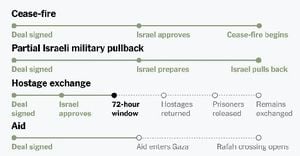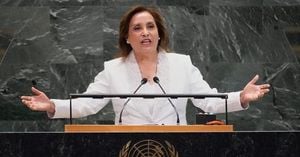On September 24, 2025, the International Monetary Fund (IMF) delivered a cautiously optimistic message regarding South Korea’s economic outlook, emphasizing that the country’s growth prospects could be bolstered by further monetary policy easing. Wrapping up its annual country visit, the IMF pointed to South Korea’s “sufficient policy space” as a key advantage in navigating the uncertain global economic environment, according to statements reported by Reuters and Fusion Media.
South Korea, Asia’s fourth-largest economy, has faced persistent headwinds in recent years, from global supply chain disruptions to shifting demand patterns and fluctuating commodity prices. Yet, the IMF’s latest assessment suggests that the nation is well-positioned to weather these challenges—provided policymakers continue to act decisively.
“With inflation expectations well-anchored and risks to inflation broadly balanced, monetary easing will help bolster the growth recovery,” the IMF stated, as quoted by Reuters. This reassurance came during the fund’s annual review of the country’s economic policies, a process that often shapes both domestic and international perceptions of a nation’s fiscal and monetary health.
The IMF’s forecast for South Korea’s economic expansion in 2025 stands at 0.9%, a figure that, while modest, signals a positive trajectory amid an uncertain global context. Headline inflation is projected to hover around 2% both in 2025 and 2026, reflecting a stable price environment that could give policymakers additional leeway to stimulate growth without stoking runaway inflation.
These projections offer a measure of comfort to investors and policymakers alike, especially considering the volatility that has characterized global financial markets in the wake of recent geopolitical tensions and shifting trade dynamics. The IMF’s confidence in South Korea’s policy toolkit—specifically its ability to further ease monetary conditions—underscores the country’s reputation for prudent economic management.
But what exactly does “sufficient policy space” mean in this context? Essentially, it refers to the central bank’s capacity to adjust interest rates or employ other monetary tools to support the economy without risking financial instability or runaway inflation. In South Korea’s case, the IMF’s endorsement suggests that the Bank of Korea could cut rates or introduce other easing measures if growth falters or if external shocks threaten the recovery.
“Monetary policy easing should help South Korea’s economic growth,” the IMF reiterated, as reported by Fusion Media. This sentiment was echoed in the fund’s official statement, which concluded its annual country visit—a routine yet influential process that brings together IMF experts and South Korean officials for a frank assessment of the nation’s economic trajectory.
The IMF’s analysis also highlights a broader trend among advanced and emerging economies: the delicate balancing act between supporting growth and keeping inflation in check. For South Korea, the prospect of stable inflation at around 2% in both 2025 and 2026 provides a crucial buffer. It means that the central bank can act to support growth without the immediate fear of fueling price spirals—a luxury not all economies currently enjoy.
Of course, the IMF’s projections are not guarantees. As Fusion Media cautions, “Trading in financial instruments and/or cryptocurrencies involves high risks including the risk of losing some, or all, of your investment amount, and may not be suitable for all investors.” The same principle applies to economic forecasts: they are subject to revision as new data emerges and as global conditions evolve.
It’s also worth noting the IMF’s broader message about the importance of sound risk management. According to Fusion Media’s reporting, “Before deciding to trade in financial instruments or cryptocurrencies you should be fully informed of the risks and costs associated with trading the financial markets, carefully consider your investment objectives, level of experience, and risk appetite, and seek professional advice where needed.” While this advice is directed at individual investors, it echoes the IMF’s own approach to economic policy: caution, vigilance, and adaptability in the face of uncertainty.
For South Korean policymakers, the IMF’s endorsement of further monetary easing is both a green light and a challenge. On one hand, it provides external validation for policies that prioritize growth and employment. On the other, it underscores the need for continued vigilance, especially as global economic conditions remain fluid. The next year will likely test the central bank’s ability to calibrate its response—too much easing could risk asset bubbles or financial instability, while too little could leave the economy vulnerable to external shocks.
Investors and businesses, for their part, will be watching closely. A stable inflation outlook and the prospect of further monetary support could encourage investment and hiring, helping to sustain the recovery. Yet, the situation remains dynamic. As Reuters notes, “The IMF made these comments in a statement concluding its annual country visit to South Korea.” Such visits are not just routine check-ins; they are opportunities for dialogue, reflection, and, sometimes, recalibration of policy priorities.
Looking ahead, the IMF’s projections suggest a path forward for South Korea—one that hinges on prudent policy choices and a willingness to adapt to changing circumstances. The country’s experience offers a valuable lesson for other economies grappling with similar challenges: flexibility, transparency, and a commitment to sound fundamentals can make all the difference in uncertain times.
At the same time, the IMF’s focus on “sufficient policy space” serves as a reminder that not all countries enjoy the same degree of flexibility. For nations with high debt burdens, fragile banking systems, or volatile inflation, the options for monetary easing may be far more limited. South Korea’s relative strength in this regard is a testament to years of careful stewardship and a culture of fiscal discipline.
As the global economy continues to evolve, South Korea’s experience will be closely watched by policymakers, investors, and analysts around the world. The IMF’s latest assessment provides a snapshot of where the country stands today—and a roadmap for the challenges and opportunities that lie ahead.
In a world where economic headlines often swing between gloom and euphoria, the IMF’s message on South Korea is refreshingly measured: growth is possible, risks are manageable, and with the right policies, the future looks promising—if not spectacular.



